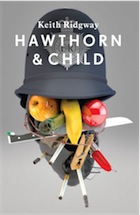Hawthorn and Child by Keith Ridgway
I started reading Keith Ridgway's Hawthorn and Child on the recommendation of John Self, who was at the time embarking on an experiment to see how effectively a book could be drawn to people's attention through social media. John's enthusiastic championing of the book meant my expectations were high; equally, he'd been very clear about the type of book Hawthorn and Child is, so I knew roughly what to expect: an unconventional narrative structure, a lack, by most definitions, of discernible plot, and a book full of hints, allusions and clues that will have you endlessly pondering their significance. On the other hand, they might not be significant at all. In one chapter, a character eavesdropping on a conversation, remarks: "This banal banter seems so completely unconnected to anything I know about that I wonder if it's coded. Why would it be coded, you idiot? They've just just drifted off into life," a remark which rather mirrors my experience of reading the book at times.
If Hawthorn and Child reminds me of anything, it's Nicola Barker's Darkmans. Darkmans has more plot (to be frank, most books do) but, like Hawthorn and Child, it was a book I kept wanting to re-read so I could piece together more of the oblique references, the throwaway remarks and word choices that you suddenly realise might be meaningful - in Hawthorn and Child, there is a recurrent theme of confusion over words, of mishearing, of not being able to find quite the right terms. Hawthorn and Child also shares a similarly mundane setting, in which odd things happen. In the opening chapter, for instance, there is the odd suggestion that a man may possibly have been shot by a ghost car. Hawthorn and Child themselves are police officers who are pursuing a mysterious gangster, Mishazzo, but this is a million miles from a crime novel. In crime novels, everything is explained, everything neatly resolved, so that the solution to the mystery becomes the point. In Hawthorn and Child, almost nothing is resolved or explained. We're not even sure what crimes Mishazzo has committed, as most of what we see him and his sidekicks doing in the book has nothing to do with their criminal activity - driving from place to place, for instance, or making small talk.
"There are millions of explanations. There's an infinite number of explanations," Hawthorn points out, for it's Hawthorn who seems the more creative thinker of the two policemen, the more willing to explore the unlikely or the impossible and whose grip on reality isn't always firm. Child is the more pragmatic of the pair - if there are millions of explanations for things, he says, then he's not going to get roped into doing the paperwork.
More like a collection of inter-related short stories than a novel in many ways, Hawthorn and Child answers few questions, and leaves much unexplained, and yet each story, each baffling incident, seems complete and satisfying and yet often vaguely unsettling at the same time. The odd awkwardness, the sense of something strange unfolding, is rendered even more bizarre by Ridgway's sparse, matter-of-face prose style. If, like me, you're sometimes attracted to odd books that raise more questions than they ask, this is a novel for you. Read it, ponder it, read it again and spend endless hours trying to unpick it.

Hi Joanne, I read your review because I'd been thinking of getting the book myself. Not sure what to think now! ;) Possibly should still just give it a try sometime.... Lane
ReplyDeleteWell, I thought it was great - but of course, books are an incredibly subjective thing.
Delete